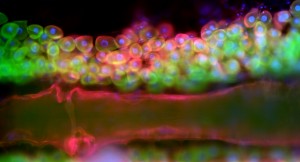A £100,000 Wellcome Trust Seed Award has been granted to fund a project using fruit flies (Drosophila) to examine an important yet poorly understood aspect of human heart physiology.
The heart senses and adapts to its own highly dynamic mechanical environment. This environment changes beat-by-beat, as well as over longer timescales, due to altered physiology or as a consequence of disease. Failure to detect and adjust cardiac performance accordingly is associated with arrhythmias and sudden cardiac death. The mechanism for this adaptation is not known.
The goal is to study the cellular and molecular basis of this mechanism using the Drosophila heart as a simple model. Preliminary data obtained for an Honours project suggests that stretch-activated mechanosensitive ion channels are key components.
Research supported by Paul Hartley’s lab here at Bournemouth University and led by Dr Barry Denholm (University of Edinburgh) will investigate the hypothesis that these channels provide a direct link to convert physical force (stretch of the cardiac tissue) into biochemical signal (ion flux), which in turn regulates heart physiology and function (contractility).












 SPROUT: From Sustainable Research to Sustainable Research Lives
SPROUT: From Sustainable Research to Sustainable Research Lives BRIAN upgrade and new look
BRIAN upgrade and new look Seeing the fruits of your labour in Bangladesh
Seeing the fruits of your labour in Bangladesh Exploring Embodied Research: Body Map Storytelling Workshop & Research Seminar
Exploring Embodied Research: Body Map Storytelling Workshop & Research Seminar Marking a Milestone: The Swash Channel Wreck Book Launch
Marking a Milestone: The Swash Channel Wreck Book Launch ECR Funding Open Call: Research Culture & Community Grant – Application Deadline Friday 12 December
ECR Funding Open Call: Research Culture & Community Grant – Application Deadline Friday 12 December MSCA Postdoctoral Fellowships 2025 Call
MSCA Postdoctoral Fellowships 2025 Call ERC Advanced Grant 2025 Webinar
ERC Advanced Grant 2025 Webinar Update on UKRO services
Update on UKRO services European research project exploring use of ‘virtual twins’ to better manage metabolic associated fatty liver disease
European research project exploring use of ‘virtual twins’ to better manage metabolic associated fatty liver disease